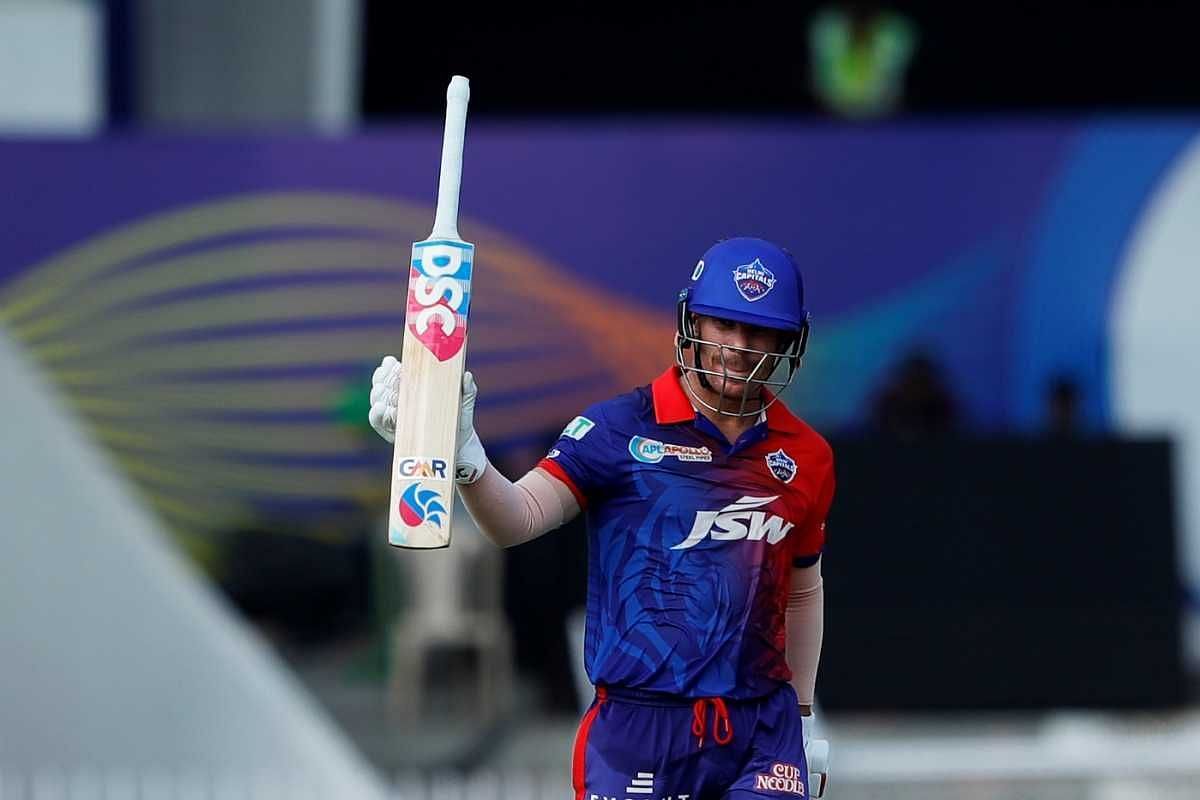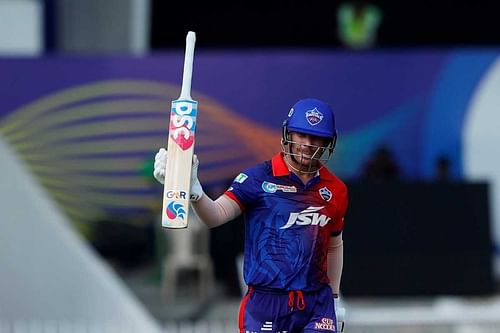
David Warner enchants SRH with an eerily familiar spell

Picture this: the Sunrisers Hyderabad (SRH) find themselves having to bat first on what seems like a tricky track. They are also up against one of the best bowling units in the Indian Premier League (IPL). On paper, they don’t have many batting resources. Their batting order wears a thin look and a lot depends on the kind of start they get.
They get off to an absolutely wretched beginning, though. They lose two wickets in the powerplay. They begin thinking if the game has already passed them by, and start wondering what might have been had they won the toss. While each of these thoughts engulfs the SRH faithful, there is one man – clad in orange, and with an iron-fist as strong as Mike Tyson, waiting to prove everyone wrong.
According to many, he is already fighting a lost cause. With dew expected to play a part later in the game, he has to ensure his IPL team gets to an above-par total – all while hoping that they don’t implode in the middle overs. For mere mortals, this seems quite improbable. For one man, though, that notion couldn’t have mattered less.
Over the next hour, David Warner jabs, stabs, slashes, and wallops the ball to all parts of the ground. At the other end, the ball is still holding in the surface and still spinning on the odd occasion. But when Warner is on strike, it’s almost as if he is the pied-piper and the ball is his rat. It turns when he wants it to. It bounces just as much as he expects it to. And, it flies off the bat as if it was always meant to.
The 2016 champions get up to a decent total – a total that seemed unimaginable at one stage, but has only become possible because of Warner. They then tighten the screws with their irresistible bowling attack and slalom their way to the hotel with two points firmly tucked into their bag.
For at least seven years, this was an eerily familiar script. He single-handedly dug them out of trouble, and more often than not, made them punch above their weight. In many ways, SRH had become Warner and Warner had become SRH; there wasn’t one without the other, and when something of that sort materialized, it just didn’t seem right.
So, when hundreds of Sunrisers fans rocked up at the Brabourne Stadium, hoping to catch a glimpse of someone who famously belonged to that parish, they were left stunned. Not because Warner was no longer clad in orange like he once was. But because the Australian was pulling out all the stops to outwit SRH – again, an unfathomable feeling for a generation of fans.
Click here to view the orange cap in IPL 2022.
David Warner conjured a magical knock against SRH
As fate would have it, the Delhi Capitals found themselves in a situation that was unnervingly congruent to circumstances that usually followed Warner at SRH. With Prithvi Shaw unavailable, Mandeep Singh opened the batting. However, the latter only lasted five deliveries. Mitchell Marsh departed soon after, leaving DC hoping for a miracle.
Miracles, however, usually happen when Warner is around, irrespective of the opposition and the conditions. When someone averages more than 42 and strikes at more than 140 in the IPL, that shouldn’t be questioned either. When batting first, though, the Australian seems to find a different gear altogether.
During his stint at SRH, which spanned from 2014-21, the opener made a living by putting up par and above-par totals on the board – scores that SRH’s well-oiled bowling unit regularly defended. It became boring after a while, considering this was a script they followed to the tee nearly every game. From their standpoint, however, it was something they had attained perfection in.
When batting first for the 2016 champions, the left-handed batter averaged more than 51 (51.91 to be precise) and struck at 142.61 – numbers that hardly anyone can rival across the board. He also scored two hundreds and 21 half-centuries batting first, indicating that when he got starts, he made them count.
Throughout the history of the IPL, Warner has the third-best average batting first (minimum of 1000 runs). Of those to have graced this league, only AB de Villiers (45.84) and JP Duminy (47.92) have a better tally. Among the batters to have the ten best averages batting first in the IPL (minimum 1000 runs), only Chris Gayle (153.39), de Villiers (161.95) and Jos Buttler (142.46) have a higher strike rate than Warner (138.8).
So, for those sitting in the SRH dugout, this was as much déjà vu as anything they’ve ever witnessed. The only difference, though, was that it benefited the team that wasn’t in orange on Thursday.
Like a lot of things in life, this will also take a lot of getting used to. In many people’s eyes, Warner still belongs to SRH and everything he does has to revolve around them. They weren’t entirely wrong. It’s just that this particular innings was to their detriment, rather than acting as a shot in the arm.
They shouldn’t really be surprised, though. This is, if anything, a spell that they have seen Warner enchant many a team with before. And, when they decided to side-line him last time out, despite just a few indifferent performances, they perhaps knew this end of the bargain too.
They weren’t just freezing out one of the best T20 cricketers on the planet (he surpassed Gayle’s tally of T20 fifties in this game and reached 400 sixes in the format, by the way), they were sacrificing someone who had defined the way they played and had become the heartbeat of their outfit.
Everything in this world comes at a cost. SRH might’ve known it too. But as their play-off hopes were deflated by a cricketer who was once famously of that parish, they would’ve been left with a sinking feeling.
It’s happened to many teams. Now it has happened to SRH. No one ever thought this day will arrive. But now that it did, only Warner could evoke the emotions he did.
Oh, as far as Warner walking into perilous situations and performing miracles is concerned, SRH know about it all too well, right?